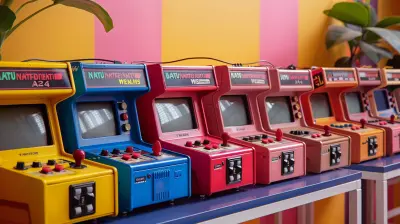How to Follow Teasers Leading Up to Game Event Announcements
18 September 2025
Gaming fans are no strangers to the thrill of anticipation. That electrifying buzz just before a big reveal, the cryptic tweets, the shadowy trailers, the cryptic websites with countdown timers—yep, we’re talking about game teasers. If you’ve ever found yourself glued to Twitter trying to decode a mysterious post from your favorite game developer, you know exactly what we’re diving into today.
So, how do you follow all the hints, cryptic messages, and subtle Easter eggs that studios drop before a major game event? Whether it’s E3, Summer Game Fest, State of Play, or the next Nintendo Direct, the hype train doesn't run without teaser breadcrumbs.
Let’s peel back the curtain and talk about how to follow teasers leading up to game event announcements—and how you can become a master at spotting every hidden clue before it goes mainstream.
Why Teasers Are a Big Deal in the Gaming World
Before we jump into the how-to, let’s take a quick look at the why.Game studios don’t just drop trailers out of nowhere anymore. Nah, that’s too easy. Today, it’s all about building suspense. Teasers amplify the hype. They stir up the fan theories. They turn every gamer into a detective. And let’s admit it—half the fun is in the guessing game itself, right?
Teasers are like digital breadcrumbs leading to the big juicy loaf: the announcement itself. And when you follow them correctly? You don’t just watch the show—you’re part of it.
Step 1: Follow the Official Channels (Yes, All of Them)
You’d be surprised how many clues are dropped in plain sight. Studios and publishers often post hints across multiple platforms. Think Twitter, Instagram, YouTube, TikTok, Reddit, Discord—heck, even LinkedIn sometimes!Keep Tabs On:
- Official Twitter accounts: These are teaser central. A single emoji tweet from a dev can send an entire fandom into theorycrafting mayhem.- YouTube channels: Teasers disguised as developer diaries or “accidental” uploads? Classic move.
- Instagram stories: Temporary, visual, and perfect for sneak peeks.
- Steam pages or Epic Games Store updates: You’d be surprised at how often details leak early here.
- Discord servers: Some publishers drop cryptic messages or even puzzles for the community to solve.
Tip: Turn on notifications for accounts related to your favorite studios. That way, you’re not missing anything subtle.
Step 2: Analyze the Teaser Like a Game Detective
So you’ve spotted a teaser. Now what?Don’t just take it at face value. Teasers are often layered. Developers love playing games even before the game is playable. That 5-second animation? That lyrics snippet in a trailer? That pixelated image? It’s not random. It’s a clue.
Things to Look Out For:
- Visual hints: Logos, color schemes, character silhouettes.- Audio Easter eggs: Background music, sound effects, voice lines—sometimes reversed (yep, play them backwards).
- URL redirections or source code clues: The curious might find hidden messages in website source codes.
- Release dates hinted by numbers: Sometimes a time stamp like "00:06:23" might mean “June 23rd.”
If it feels too mysterious to be a coincidence—it’s probably not.
Step 3: Tap Into the Gaming Community
You don’t have to play Sherlock Holmes solo on this one. Social media is the megaphone of every good teaser. And the community? It’s where the decoding magic happens.Where the Magic Happens:
- Reddit threads (e.g., r/Games, r/GamingLeaksAndRumours): These folks spot things fast.- Twitter replies and threads: You’ll find some wild but surprisingly accurate theories here.
- YouTube reaction and analysis videos: Some creators break down every frame. Literally.
- Twitch streamers doing live investigations: Turning teaser-following into live entertainment is a growing thing.
Join the conversation, contribute if you’ve got a theory, and feel free to go down the rabbit holes. The deeper, the better.
Step 4: Use Tools to Stay Ahead of the Curve
Want to take it to pro level? You’re gonna need a few digital sidekicks.Tools That Help:
- Google Alerts: Set alerts for game names or developers you’re tracking.- TweetDeck: Organize real-time tweets from multiple accounts in one place.
- Subreddit monitoring bots: Some Discord servers have bots that alert you when certain subs post new content.
- Reverse image search: Spot reused assets or hidden logos in teaser art.
- Audio analysis tools: If you're really dedicated, check waveforms to compare sounds.
These can help you act faster than the average fan. And hey, who doesn’t want to be that “insider” in their friend group?
Step 5: Track The Timeline (And Patterns)
Most studios follow a pattern. Teasers tend to come in waves, especially ahead of big game events like E3 or Gamescom.Patterns You’ll Start Noticing:
- Teaser drop > 3-5 days later > Official announcement- Monday or Thursday: Common days for teaser tweets.
- Late-night tweets: Perfect time to sneak in something cryptic.
- Anniversaries: Studios love linking announcements to historical dates (first game release anniversary, studio founding, etc.)
By keeping an eye on calendar clues and syncing with past teaser campaigns, you can actually predict the next big tease before it happens. Yup, seriously.
Step 6: Watch for Cross-Studio Teasers and Collabs
Game studios love winking at each other. A teaser from one studio might hint at a crossover or collab with another. Fortnite’s been doing this for years. And remember when Kojima teased Death Stranding with cryptic tweets that didn’t even mention the game?If a studio suddenly posts something off-brand or shares another studio’s teaser, pay attention—there’s probably a reason.
Step 7: Avoid Pitfalls (The Internet Is Wild, After All)
Now, not every teaser is gold. And not all info out there is real. It’s easy to fall for fake leaks, doctored screenshots, or just really convincing fan art.How to Stay Smart:
- Cross-reference sources: If only one user is talking about it? Probably fake.- Watch for watermarks: “Confidential” or “Internal Use Only”? Could be real—or just clickbait.
- Check usernames: Official accounts have that little verified checkmark or URL authenticity.
- Trust your gut: If it smells fishy, it probably is.
It’s okay to get swept up in the excitement—just don’t bet the farm on every “leak” you see.
Bonus: Join ARGs When They Happen
Alternate Reality Games (ARGs) are like the ultra-nerdy big brother of teasing.Some devs go absolutely nuts and create entire minigames, websites, and even real-world scavenger hunts as part of pre-announcement hype. If you see one of these unfold, jump on it. They’re wild. They’re fun. And they usually lead to something huge.
Remember when Valve did that Portal 2 ARG? Or when Blizzard teased Sombra in Overwatch through hacking mini-games? Yeah, legendary stuff.
Final Thoughts: It’s About the Journey, Not Just the Reveal
So yeah, following game teasers is part strategy, part fandom, and a whole lot of fun. It turns waiting into an actual game. You start feeling like a behind-the-scenes VIP, piecing together a puzzle before the rest of the world catches on.And the best part? That moment when all your guessing, analyzing, and theory-crafting finally pay off with a glorious game reveal trailer. Goosebumps, folks. Absolute goosebumps.
So next time your favorite studio posts something weird, remember it's not “just a tweet.” It might be the start of something epic.
Get involved, stay curious, and above all—enjoy the chase.
all images in this post were generated using AI tools
Category:
In Game EventsAuthor:

Aurora Sharpe
Discussion
rate this article
1 comments
Cara Russell
Stay active on social media for real-time updates and insights!
September 30, 2025 at 4:07 AM

Aurora Sharpe
Absolutely! Social media is key for real-time updates and insights on game event announcements. Stay tuned!


